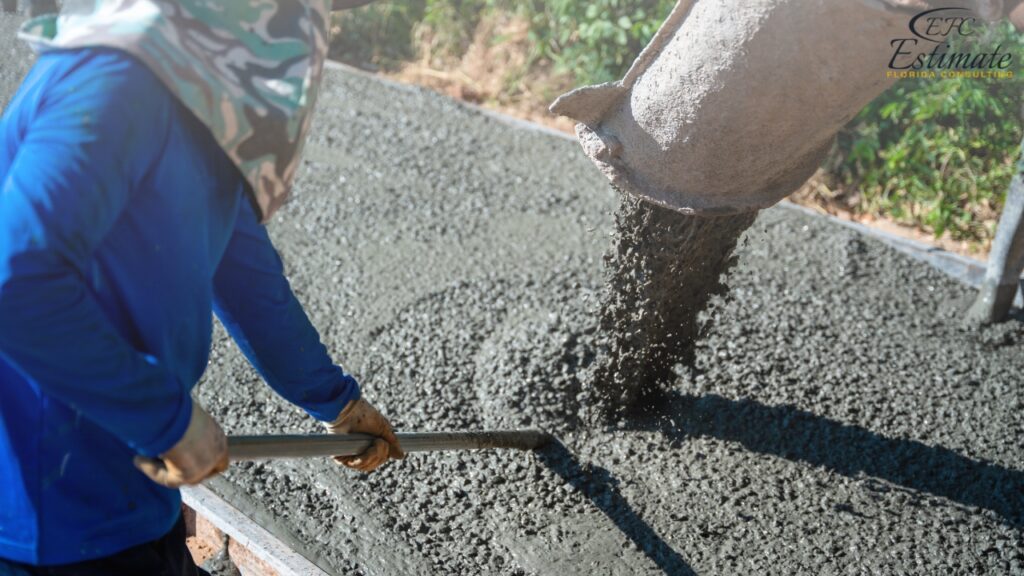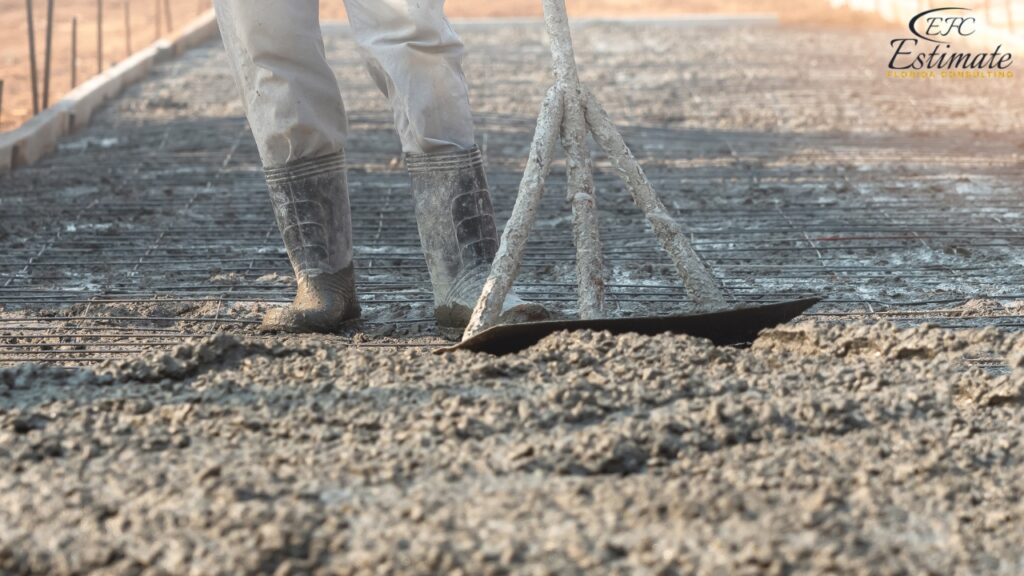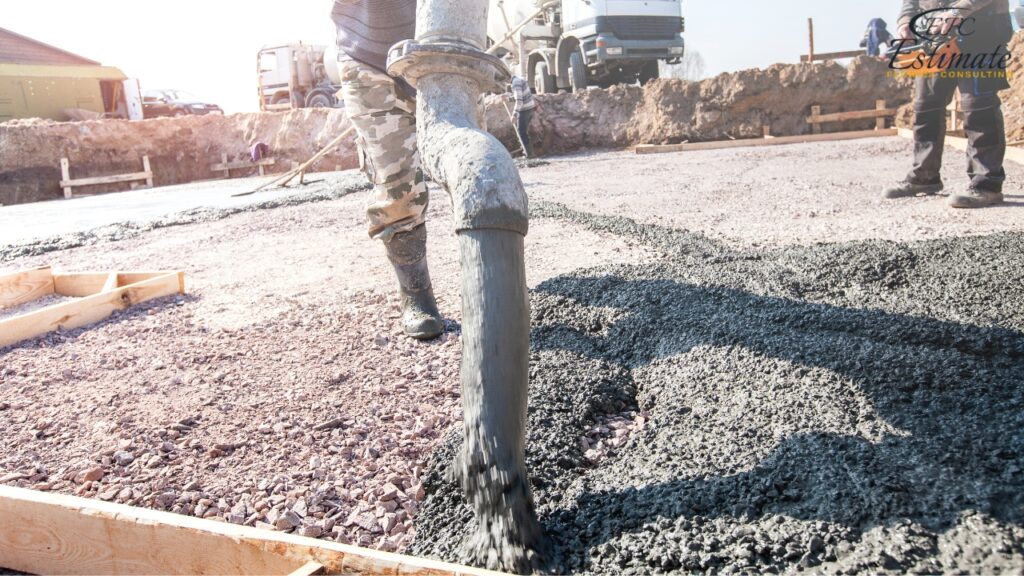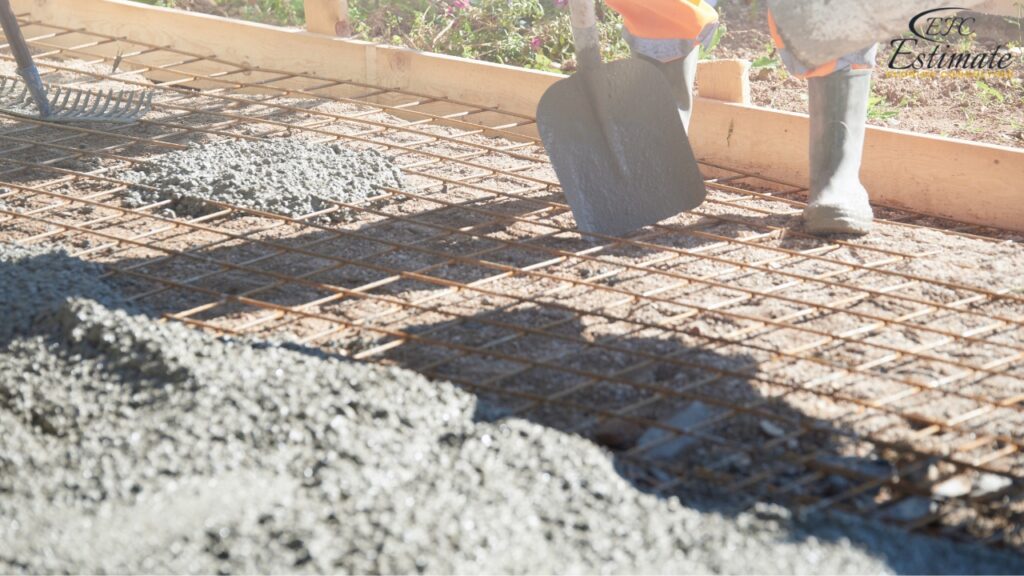How Much Does It Cost to Have 3 Yards of Concrete Delivered?
The cost to have 3 yards of concrete delivered typically ranges from $696 to $1,430. This price depends on factors such as the type of concrete, delivery distance, and any additional fees. Breaking it down per cubic yard, the cost averages between $232 and $477. For a more precise estimate, consider the specifics of your project and local rates. It’s always a good idea to get quotes from multiple suppliers to ensure you get the best price and service for your concrete delivery needs.

Average Cost of Concrete
The average cost of concrete typically ranges from $125 to $200 per cubic yard. For 3 yards of concrete, this translates to a base material cost of $375 to $600. However, this is just the starting point, as other factors can influence the total cost. Prices can vary depending on the region, the quality of the concrete mix, and any specific additives required for your project. It’s important to get detailed quotes from suppliers to understand what is included in the price per cubic yard. Additionally, understanding these nuances can help you better negotiate with suppliers for a fair price.
Concrete Quantity | Estimated Cost Range |
1 Yard | $163 – $260 |
3 Yards | $488 – $780 |
Delivery Charges
Delivery charges are a significant part of the overall cost. Most suppliers charge a flat fee for delivery, which can range from $78 to $260, depending on the distance from the supplier to the delivery site. Some suppliers may also charge a per-mile fee if the delivery site is far from the concrete plant. Additionally, there might be extra charges if the delivery site has difficult access, requiring specialized equipment or more labor. Ensuring that the site is easily accessible can help reduce these extra charges.
Delivery Distance | Estimated Cost Range |
Local (0-20 miles) | $78 – $130 |
Moderate (20-50 miles) | $130 – $195 |
Long Distance (50+ miles) | $195 – $260 |
Additional Fees
There may be additional fees associated with the delivery of concrete. These can include:
Short Load Fees
If you order less than the truck’s full capacity (usually around 10 yards), you might incur a short load fee, which can range from $65 to $130 per cubic yard. This fee compensates the supplier for delivering less than a full load. Short load fees can add up quickly, so it’s beneficial to combine orders if possible to avoid these extra charges. Planning and coordinating with neighbors or other projects can also help mitigate these costs.

Weekend or After-Hours Delivery Fees
Deliveries outside of regular business hours may incur additional charges, typically ranging from $65 to $130. These fees ensure that the supplier can cover the costs of operating outside of normal hours. Planning your project schedule to avoid weekend or after-hours deliveries can help keep costs down. By scheduling during regular business hours, you can avoid unnecessary expenses.
Fuel Surcharge
Depending on current fuel prices, some suppliers may add a fuel surcharge to cover transportation costs. This surcharge typically ranges from $26 to $65 and fluctuates with fuel price changes. Checking the current fuel rates and discussing this with your supplier can help you anticipate and budget for this additional cost. Being aware of these charges can also help you plan for the best timing to order concrete, potentially saving money.
Additional Fees | Estimated Cost Range |
Short Load Fee | $65 – $130 per yard |
Weekend/After-Hours Fee | $65 – $130 |
Fuel Surcharge | $26 – $65 |
Get 5 New Leads Next 7Days With Our System
- Multi-Family Building
- Hotel Building
- Hospital Building
- Warehouse Building
- High-Rise Building
- Shopping Complex
Factors Influencing the Cost
Type of Concrete
The type of concrete you need can affect the price. Standard concrete mix is generally the least expensive, but if you require specialized concrete such as high-strength, fiber-reinforced, or colored concrete, the cost per yard will be higher. Each type of concrete has specific applications and benefits, so choosing the right mix for your project is crucial for both performance and cost-efficiency. Understanding your project’s requirements will help you select the most appropriate and cost-effective concrete type.
Concrete Type | Estimated Cost per Yard |
Standard Mix | $163 – $195 |
High-Strength | $195 – $228 |
Fiber-Reinforced | $208 – $234 |
Colored | $228 – $260 |
Distance from Supplier
The further the delivery site is from the concrete supplier, the higher the delivery charges will be. It’s essential to consider the proximity of your project site to the nearest concrete plant when budgeting for delivery costs. Closer proximity not only reduces transportation costs but also helps ensure the concrete remains fresh during delivery, which is critical for its performance and longevity. Planning for a supplier nearby can lead to significant savings and better quality concrete.
Short Load Fees
If you order less than the truck’s full capacity (usually around 10 yards), you might incur a short load fee, which can range from $65 to $130 per cubic yard. This fee compensates the supplier for delivering less than a full load. Short load fees can add up quickly, so it’s beneficial to combine orders if possible to avoid these extra charges. Planning and coordinating with neighbors or other projects can also help mitigate these costs.

Order Size
Ordering less than a full truckload of concrete can result in short load fees. If you have multiple small projects, consider combining orders to minimize these fees. Alternatively, coordinating with nearby projects to share a delivery can help reduce costs. Planning your concrete needs efficiently can lead to significant savings, especially for larger projects requiring multiple deliveries. This strategy can also help streamline project timelines and reduce logistical challenges.
Tips for Reducing Costs
Plan Ahead
Planning your concrete order carefully can help you avoid unnecessary fees. Ensure you have accurately calculated the amount of concrete needed to prevent ordering too little or too much. This can help you avoid additional charges for extra deliveries or short load fees. Proper planning also allows you to schedule deliveries during regular business hours, avoiding after-hours fees. Additionally, planning can help you take advantage of bulk purchasing discounts or other promotions offered by suppliers. Proper foresight can significantly reduce overall project costs.
Compare Quotes
Get quotes from multiple suppliers to compare prices and services. This can help you find the best deal and ensure you are not overpaying for delivery or materials. Be sure to ask about any additional fees that may apply to get a complete picture of the total cost. Comparing quotes can also provide insights into different supplier options, allowing you to choose one with the best reputation and customer service. Some suppliers may offer package deals or discounts for larger orders, which can further reduce your costs. This process can also build relationships with reliable suppliers for future projects.
Combine Orders
If possible, combine orders for multiple projects to reduce delivery charges and short load fees. This is particularly useful for small projects that may not require a full truckload of concrete. Coordinating with neighbors or nearby projects can also help share delivery costs. By pooling orders, you can maximize the efficiency of the delivery and minimize individual costs. This approach can also reduce the environmental impact by minimizing the number of delivery trips required. Efficient resource use is beneficial for both cost and sustainability.
Choosing the Right Supplier
Selecting a reliable and experienced supplier is crucial for ensuring the quality of the concrete and the timeliness of the delivery. Look for suppliers with good reviews and a proven track record. Ask about their delivery capabilities and any guarantees they offer on their products. A reputable supplier can provide valuable advice on the best type of concrete for your project and ensure that it is delivered fresh and ready to use. Building a good relationship with your supplier can also lead to better deals and priority service for future projects. Trust and reliability are key factors in supplier selection.
Understanding Concrete Mix Types
Different projects may require different types of concrete. Understanding the various mix types can help you choose the right one for your needs and budget. Standard concrete is suitable for most general construction projects, while high-strength concrete is used for heavy-duty applications. Fiber-reinforced concrete adds durability and is ideal for areas with high traffic or load-bearing requirements. Colored concrete can enhance the aesthetic appeal of your project but comes at a higher cost. Knowing the specific requirements of your project will help you choose the most cost-effective and suitable concrete mix. Proper selection ensures both functionality and cost-effectiveness.
Calculating the Amount of Concrete Needed
Accurately calculating the amount of concrete needed for your project is essential to avoid over-ordering or under-ordering. Use a concrete calculator or consult with your supplier to determine the exact amount required based on the dimensions of your project. This ensures that you order the right quantity, minimizing waste and additional costs. Accurate calculations can also prevent project delays and ensure a smooth construction process. Consulting with a professional can provide more precise measurements and recommendations. This precision leads to better budget management and project execution.
Considering Environmental Factors
Environmental factors, such as weather conditions and site accessibility, can impact the delivery and placement of concrete. Plan your project considering these factors to avoid delays and additional costs. For instance, hot weather can cause concrete to set too quickly, while rain can affect its quality. Ensuring that the site is easily accessible for the delivery truck can also prevent extra charges for difficult deliveries. Preparing the site in advance, such as clearing obstructions and ensuring proper ground conditions, can facilitate a smoother delivery process. Taking environmental factors into account ensures project continuity and quality.

Scheduling Delivery
Properly scheduling the delivery of concrete is crucial for a smooth and efficient project. Coordinate with your supplier to ensure that the concrete arrives at the optimal time for your project. Consider factors such as traffic conditions and the availability of labor to handle the concrete upon arrival. Proper scheduling helps prevent delays and ensures that the concrete is placed correctly and efficiently. Timely delivery is essential for maintaining the concrete’s quality and workability, ensuring the best results for your project. Efficient scheduling can also minimize labor costs and project duration.
Potential Issues with Concrete Delivery
Understanding potential issues that may arise during concrete delivery can help you prepare and mitigate these risks. Factors such as traffic delays, unexpected weather changes, and site accessibility can all impact delivery. Being prepared for these issues by having contingency plans in place can save time and money. Communicating with your supplier about potential challenges can also help them prepare and provide solutions, such as adjusting delivery times or using specialized equipment for difficult sites. Proactive problem-solving ensures smoother project execution and minimizes disruptions.
Importance of Fresh Concrete
Ensuring that the concrete delivered is fresh is crucial for the quality of your project. Fresh concrete is easier to work with and ensures proper curing and strength. Discuss with your supplier the best practices for maintaining the freshness of the concrete during transport and delivery. Fresh concrete provides better bonding and structural integrity, which is essential for the durability and longevity of your construction. Ensuring freshness also means better finish quality and less likelihood of structural issues. Proper handling and timing are critical for achieving optimal results.
Handling Delivery Issues
Knowing how to handle delivery issues when they arise can make a significant difference in the success of your project. Have a plan in place for addressing common problems such as delays, incorrect orders, or quality concerns. Establishing good communication with your supplier can help resolve issues quickly and efficiently. Having a backup plan and additional resources ready can prevent minor issues from becoming major setbacks. Effective issue management ensures that the project stays on track and within budget.
Download Template For Concrete Project Breakdown
- Materials list updated to the zip code
- Fast delivery
- Data base of general contractors and sub-contractors
- Local estimators

Conclusion
The cost of having 3 yards of concrete delivered can vary widely based on factors such as the type of concrete, delivery distance, and additional fees. By understanding these factors and planning accordingly, you can create a realistic budget and ensure the successful completion of your project. Proper planning and budgeting are essential for managing costs effectively and avoiding unexpected expenses. Taking the time to research and compare options can also help you find the best value for your investment. Ensuring that you choose the right supplier and type of concrete for your needs will contribute to the success and durability of your project. Thorough preparation and strategic decision-making are key to optimizing costs and achieving high-quality results.
FAQs
The cost typically ranges from $696 to $1,430. This price depends on factors such as the type of concrete, delivery distance, and any additional fees.
The average cost per cubic yard of concrete typically ranges from $125 to $200. For 3 yards, this translates to $375 to $600 for the concrete alone.
The type of concrete needed can significantly impact the price. Standard concrete is usually the least expensive, while specialized types like high-strength, fiber-reinforced, or colored concrete cost more.
Concrete Types and Costs:
- Standard Mix: $163 – $195 per yard
- High-Strength: $195 – $228 per yard
- Fiber-Reinforced: $208 – $234 per yard
- Colored: $228 – $260 per yard
The further the delivery site is from the concrete supplier, the higher the delivery charges will be. Proximity to the concrete plant can reduce costs and ensure fresher concrete.
Selecting a reliable and experienced supplier ensures the quality of the concrete and timely delivery. A good supplier provides valuable advice and support, helping you choose the best concrete type for your project.
Understanding different concrete mix types helps in selecting the right one for your needs and budget, ensuring optimal performance and cost-efficiency for your project.
Use a concrete calculator or consult with your supplier to determine the exact amount required based on the dimensions of your project, ensuring you order the right quantity and avoid waste.
Environmental factors like weather conditions and site accessibility can affect delivery and placement of concrete. Plan accordingly to avoid delays and additional costs.
Fresh concrete is easier to work with and ensures proper curing and strength. Discuss best practices with your supplier to maintain concrete freshness during transport and delivery.
Common issues include traffic delays, unexpected weather changes, and site accessibility. Having contingency plans in place and communicating with your supplier can help mitigate these risks.
Proper scheduling ensures the concrete arrives at the optimal time for your project, preventing delays and ensuring efficient placement. Coordinate with your supplier to consider traffic conditions and labor availability.
Google Reviews



Process To Get to Have 3 Yards of Concrete Delivered Estimate Report
Here I am going to share some steps to get to have 3 yards of concrete delivered estimate report.
-
You need to send your plan to us.
You can send us your plan on info@estimatorflorida.com
-
You receive a quote for your project.
Before starting your project, we send you a quote for your service. That quote will have detailed information about your project. Here you will get information about the size, difficulty, complexity and bid date when determining pricing.
-
Get Estimate Report
Our team will takeoff and estimate your project. When we deliver you’ll receive a PDF and an Excel file of your estimate. We can also offer construction lead generation services for the jobs you’d like to pursue further.

